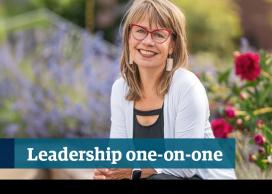Dr. John Innes is Dean of the Faculty of Forestry. He came to British Columbia in 1999, having previously worked in the Swiss Federal Institute for Forest, Snow and Landscape Research. He is actively involved with climate change research, particularly its effects on forest ecosystems. In 2007, he was part of the Intergovernmental Panel on Climate Change (IPCC) team that shared the Nobel Peace Prize with Al Gore.
Dr. Innes teaches in the field of international and sustainable forestry. Under his leadership, the Faculty has taken significant steps toward broadening the curricula and academic content to reflect changing realities in the forest and conservation sectors.
Q1. What quality do you most admire in a leader?
JI: Honesty. Trust is extremely important. If you don’t feel you can trust someone, it can severely undermine your relationship. I think it is important to be honest when giving people constructive feedback, as well as giving praise. Building trust also helps people to be open about issues.
Q2. What makes you laugh?
JI: I often laugh at some of the absurdities of working within the university system. I also sometimes laugh at life in general. You’ve got to laugh at things to keep your spirits up. I often think of the book “Don’t Sweat the Small Stuff” by Richard Carlson. You have to laugh at the small stuff. I enjoy live comedians such as Barry Humphries (Dame Edna Everage), as well as classic British comedians such as Morecambe & Wise and The Two Ronnies.
Q3. Who inspires you, and why?
JI: My biggest inspiration was a woman called Elsie Bowerman, who went to school with my grandmother. I occasionally saw her when I was a child and I still recall that she always had something positive to say. I later learned that she was a survivor of the Titanic, as well as a suffragette. She became the first woman barrister at the Old Bailey in England, and helped set up the United Nations Commission on the Status of Women. My grandmother was also instrumental in my life, as she was in the first female intake at the University of Cambridge. Both my grandmother, and Elsie, instilled my values and the respect that I have for women. Their impact remains with me today.
Q4. What is your biggest accomplishment so far at UBC?
JI: On a personal level, it has to be being part of the Intergovernmental Panel on Climate Change (IPCC), which resulted in a shared Nobel Peace Prize with Al Gore. With regard to my time at UBC, I would say I am proud of the Haida Looplex X canoe that hangs in our Forest Sciences Centre atrium and everything that it represents. I believe the Faculty of Forestry is one of the leaders at UBC, with regard to aboriginal relationships. During my time as Dean, we have done a lot of work to ensure our Faculty is more inclusive, diverse and equitable.
Q5. What is the most important lesson you’ve learned?
JI: The most important lesson I have learned during my career is to listen. And it is much more than just hearing what people have to say. It is about being aware of the undercurrents, being empathetic and noticing body language. We need to spend less time talking and more time listening.
Q6. How do you like to recharge?
JI: I love to go on long walks with my Labradoodle, Jarrah (named after an Australian tree). If I want a ‘turbo recharge’ then I go skiing in Whistler.
Q7. For you, what makes UBC different?
JI: It has to be the location! This is a beautiful place, especially when the sun is shining. The Vancouver campus contributes so much to the student experience. In our Faculty, we offer a very outdoor, experiential program, so geography plays a key role. Students have the opportunity to spend time at our research forests in Maple Ridge and Williams Lake, and they can also now attend semesters on Haida Gwaii.
Q8. What is the best advice you were ever given?
JI: I recall that when I became Dean, a retiring professor said: “If you don’t enjoy it, don’t do it.” Admittedly, there are aspects to any role that are not as enjoyable as others, but you need to maintain that sense of humour and enjoy as much as you can. I have been Dean for almost nine years and I am still enjoying it!
Q9. What do you value in your colleagues?
JI: This brings me back to honesty, and integrity. I am very proud of my leadership team and the staff who support me in the Dean’s Office. Our Faculty plan states that we will create a respectful atmosphere, where people feel appreciated. I feel we have done that in the Faculty and our students sense it.
Q10. What would you like to be remembered for?
JI: I would like to be remembered for being fair, and for creating a positive atmosphere. Our Faculty has grown enormously during my time here, expanding from 400 students to 1,200. Our students travel the world and bring a global perspective back with them, creating a dynamic and exciting atmosphere in the Faculty. I hope this continues!
Q11. If you could have a super power, what would it be?
JI: To speak more languages — especially First Nations languages. I do speak some German, French and a little Italian. When I was an undergrad, I also learned a little Swahili. Language is so important and vital for communication. To speak even more languages would be wonderful.
Q12. What do you think the potential is for the Faculty of Forestry at UBC?
JI: The potential is huge! If we are allowed to keep growing, the excellence that we have already achieved will continue to develop. We have such potential, with incredible students, faculty and staff. Many people are mistaken and think that forestry is about cutting down trees — but they are wrong. Forestry is about growing and protecting our forests and we increasingly see the forest rather than the trees. A third of the world’s land surface is forested — and we need to look after those forests.
I think we have huge potential in the future, and that we will play a key role in terms of stewarding the world’s forests. We need to remember that everything is connected. That is why we have such close partnerships with many First Nations communities.
Published: February 1, 2018
Interviewed by: Kate Hunter, UBC Internal Communications



